Discover the top 10 Market Maker Forex Brokers, curated into a comprehensive list for traders. Market Makers Forex Brokers are desk dealing brokers that create their own market backed by their own liquidity and establish market prices.
Market Maker Brokers executes your orders internally, unlike ECN/STP brokers that route their trades through the interbank market. This ensures that your orders are executed quickly, even when there’s no matching order in the open market.
We at WR Trading have analyzed and ranked these brokers based on their trading conditions, execution speeds, reputation, transparency, and regulation so that traders can complete their trades without any fear of manipulation.
List of Top 10 Market Maker Forex Brokers
Here is our list of the top 10 Market Maker Forex Brokers:
Broker:
Advantages:
Account:
- Multiple Regulations
- Leverage up to 1:400
- Minimum Deposit $100
- 1.260+ Assets
- Copy Trading available
- MT4, MT5, and own platforms
- $50 Minimum Deposit
- Zero commission for real stocks and ETF trades, 1% on cryptos
- 5,000+ Markets
- Copy Trading available
- eToro investing platform and app
- Multiple regulations (FCA, CySEC, & more)
- Regulated by multiple authorities
- Spreads from 0.0 Pips
- Leverage up to 1:200
- Commission from 0% per lot
- 2,100+ tradable assets
- xStation 5, xStation Mobile
- Spreads from 0.6 Pips
- Leverage up to 1:1000
- Over 1,000+ Markets
- Negative Balance Protection
- No Requotes & No Rejections
- MT4 & MT5 Platforms
- Regulated by CySEC, ASIC, FSC and DFSA
- Multiple regulations
- Leverage up to 1:50
- Demo account available
- More than 100 FX pairs
- No Commission
- Plus500 WebTrader, Plus500 App
- No Minimum Deposit
- Spreads from 0.6 Pips
- Access to 17,000+ Markets
- Leverage up to 1:200
- Low Commissions from $3 per trade
- Regulated by Tier-1 Authorities (FCA, ASIC, MAS)
- 1,000+ available assets
- Standalone or Trading Station
apps - Leverage up to 1:1000
- Multi-regulated, e. g. ASIC & FCA
- 12,000+ available assets
- Spreads from 0.0 Pips
- Leverage up to 1:500 (EU: 1:30)
- $0 Minimum deposit
- CMC Markets, MT4 and TradingView
- Multi-regulated, e. g. BaFin, ASIC & FCA
- More than 350 tradable assets
- Spreads from 0.1 Pips
- Leverage up to 1:30
- Demo Account
- $50 Minimum Deposit
- CySEC regulated
- Libertex Platform, MT4/MT5
- Multiple regulations
- Spreads from 0.0 Pips
- Commission: fixed $5 per $100k USD traded on FX
- More than 80 FX pairs
- Leverage up to 1:50
- Forex.com App, Forex.com Web Trader, MT5
1. AvaTrade
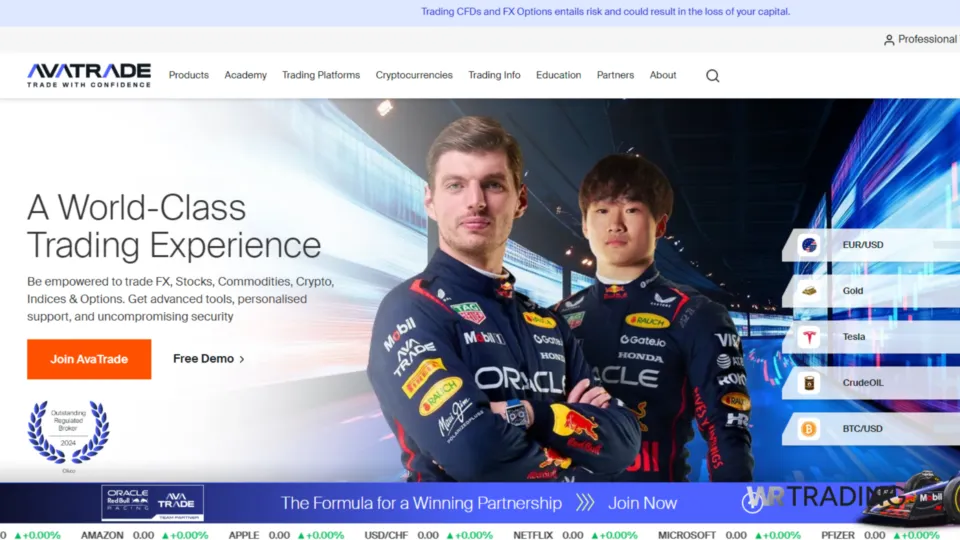
AvaTrade is number one on our list of top Market Maker Forex Brokers at WR Trading. It is a desk-dealing broker that offers regulated and user-friendly platforms for all traders. It supports a wide range of assets for trading, like Crypto, Commodities, CFDs, Stocks, etc. While it doesn’t offer traditional style trading like ECN/STP, the spreads are still very competitive.
The broker’s algorithm is modelled in a way that ensures fairness to both the broker and trader, with no reason to suspect foul play. Since every trade is handled in-house, it executes your orders much faster. Also, there is low volatility in prices when compared to ECN/STP networks with no commissions charged on trades executed, and leverages up to 1:400.
Key Facts about AvaTrade
| Feature | Information |
|---|---|
| Market Maker Forex Broker | Yes |
| Minimum Deposit | $50 |
| Execution Type | Market Maker |
| Trading Platforms | MT4, MT5, WebTrader, DupliTrader, AvaOptions, AvaTrade App |
| Trading Instruments | Forex, Stocks, Indices, ETFs, Commodities, Energies, and Futures |
| Leverage | Up to 400:1 |
| Spread | 0.6-0.8 pips |
| Commissions | Zero |
| Regulations | FFAJ, CySEC, ISA, IIROC, ADGM/FSRA, CBI, BVIFSC, FSCA, ASIC, SFC |
| Deposit Options | Bank Transfer, Credit/Debit Card, Neteller, Skrill, PayPal |
| Customer Support | 24/7 |
2. eToro
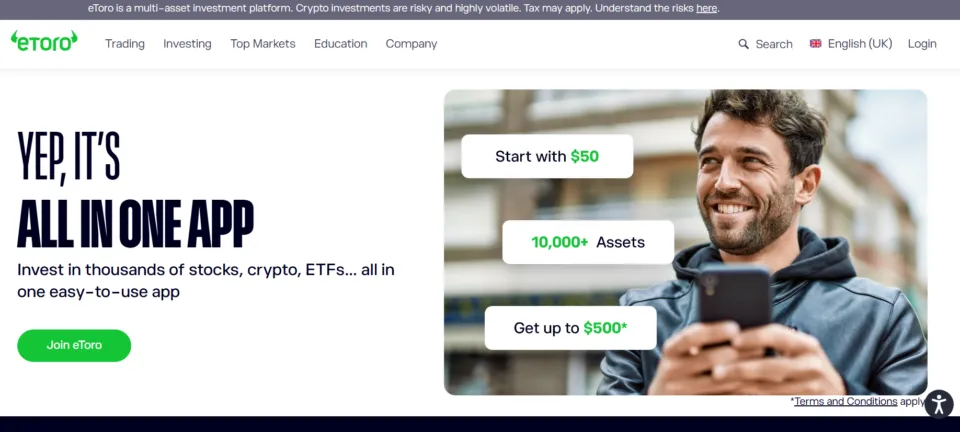
Second on our list of top Market Maker Forex Brokers is eToro. Due to its in-house execution, the broker offers fast order processing while ensuring all round fairness on trade execution. eToro provides access to over 7000+ assets, with an intuitive user interface for traders.
While there are no commissions on trades, there are other fees included on the platform. For instance, there is a $10 fee charged for each month if your account has been inactive for the past 12 months. Also, there is a $5 withdrawal fee for each withdrawal initiated and a $50 minimum deposit for any account.
Unlike most platforms that use popular trading platforms like MT4 and MT5, eToro only uses its own proprietary platform (eToro Trading Platform) for all trades.
Key Facts about eToro
| Feature | Information |
|---|---|
| Market Maker Forex Broker | Yes |
| Minimum Deposit | $50 |
| Execution Type | Market Maker |
| Trading Platforms | Etoro Trading Platform |
| Trading Instruments | Forex, Stocks, Indices, ETFs, Commodities, Crypto |
| Leverage | Up to 400:1 |
| Spread | From 1.0 pips |
| Commissions | Zero |
| Regulations | FCA, CySEC, MFSA, ASIC, FSAS, FSRA |
| Deposit Options | Bank Transfer, Credit/Debit Card, Neteller, Skrill |
| Customer Support | 24/7 |
3. XTB
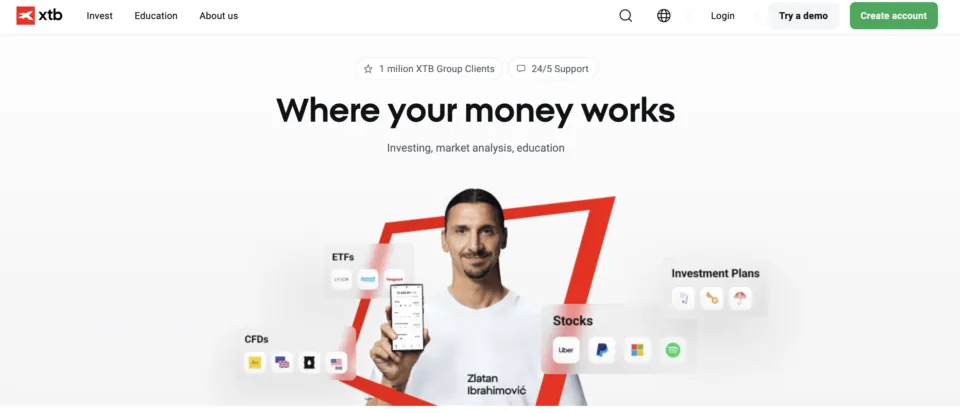
XTB is third on our list of top Market Maker Forex Brokers. On XTB, traders can access over 11,000 instruments, including ETFS, Commodities, CFDs, Forex, Stocks, and Indices.
Traders enjoy no commission on stock and ETFs up to 100,000 Euros of monthly turnover. On XTB, there is no limit to how much you can deposit, and for every deposit made, there are no charges incurred. Withdrawals above $50 are completed for free and are processed within 1 business day.
Key Facts about XTB
| Feature | Information |
|---|---|
| Market Maker Forex Broker | Yes |
| Minimum Deposit | N/A |
| Execution Type | Market Maker |
| Trading Platforms | Proprietary trading platform, XTB App |
| Trading Instruments | Stocks, CFDs on Indices, ETFs, CFDs on Commodities, CFDs on Forex |
| Leverage | Up to 500:1 |
| Spread | 0.8 pips |
| Commissions | $0 for the first 100,000 deposit. 0.2% on deposits above this range. |
| Regulations | FSC, FCA |
| Deposit Options | Bank Transfer, Credit/Debit Card, Neteller, Skrill |
| Customer Support | 24/5 |
4. XM
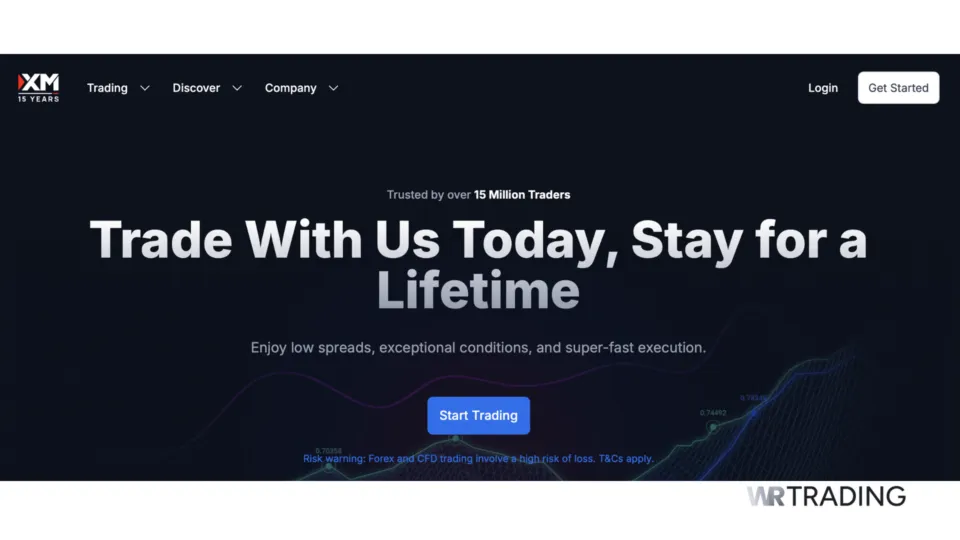
XM ranks as our 4th best Market Maker Forex broker, recognized for its exceptional educational resources and in-depth market analysis. With over 15 years of experience in the Forex industry, XM has built a strong global presence, offering its services to clients in more than 190 countries.
The broker gives traders access to a wide range of global assets, supported by reliable execution and competitive trading conditions. Additionally, XM offers generous deposit bonuses, making it an attractive option for both new and experienced traders looking to maximize their trading capital.
Key Facts about XM
| Feature | Information |
|---|---|
| Market Maker Forex Broker | Yes |
| Minimum Deposit | $5 |
| Execution Type | Market Maker |
| Trading Platforms | MT4, MT5, XM App |
| Trading Instruments | Forex, Equity Indices, ETFs, Commodities, Energies, Precious Metals, Shares, Crypto, Turbo Stocks, Energies, Thematic Indices |
| Leverage | Up to 1000:1 |
| Spread | From 0.8 pips |
| Commissions | Zero commission except shares account |
| Regulations | FSC (Belize), FSC (Mauritius), FSA |
| Deposit Options | Bank Transfer, Credit/Debit Card, Neteller, Skrill |
| Customer Support | 24/7 |
5. Plus500
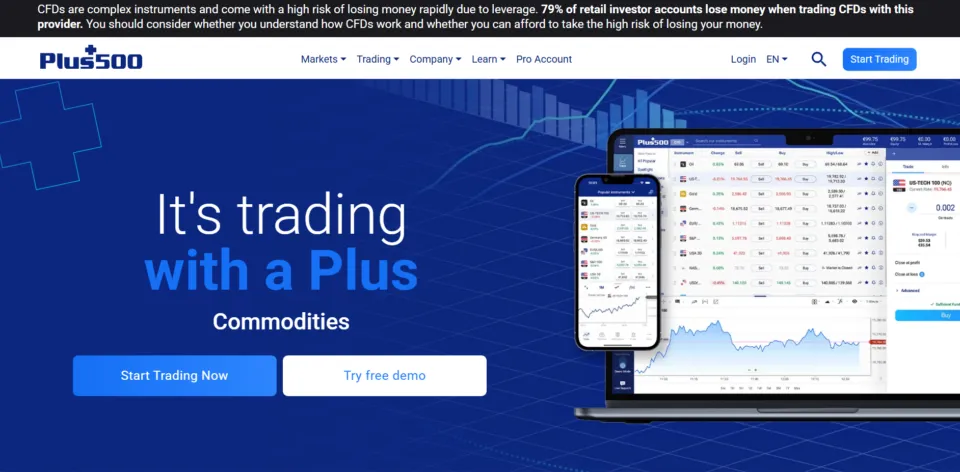
Plus500 ranks fifth on our list of top Market Maker Forex Brokers because of its fast and reliable order execution. To ensure a seamless trading experience, the broker absorbs all deposit and withdrawal processing fees for its clients.
Traders also enjoy several key benefits, including zero-commission trading with tight spreads, leverage of up to 1:300, real-time price quotes, and quick, secure withdrawals. These features make Plus500 a compelling choice for traders seeking efficiency and cost-effectiveness.
Key Facts about Plus500
| Feature | Information |
|---|---|
| Market Maker Forex Broker | Yes |
| Minimum Deposit | $100 |
| Execution Type | Market Maker |
| Trading Platforms | Plus500 proprietary Trading Platform, Plus500 App |
| Trading Instruments | Forex, Shares, Indices, ETFs, Commodities, Energies, Precious Metals, CFDs, Crypto |
| Leverage | Up to 300:1 |
| Spread | Varies based on the market |
| Commissions | Zero |
| Regulations | FCA |
| Deposit Options | Bank Transfer, Credit/Debit Card, Neteller, Skrill |
| Customer Support | 24/7 with multiple languages supported |
6. IG
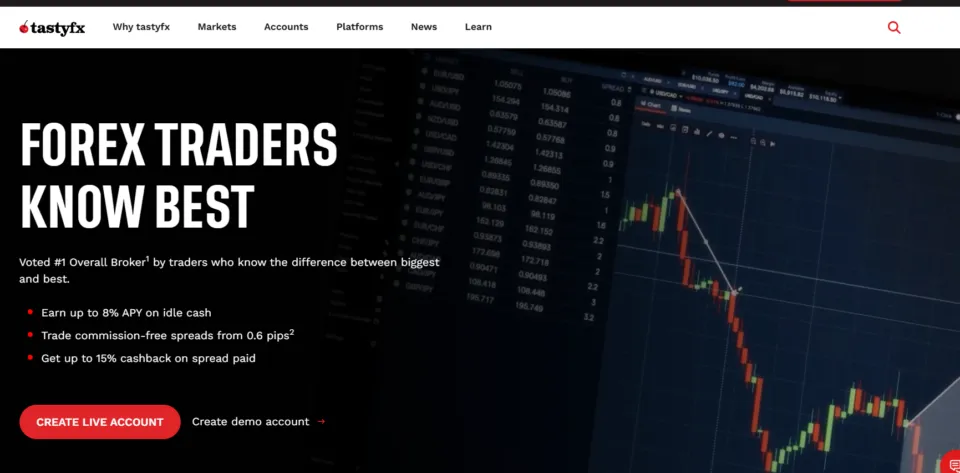
Next on our list of top Market Maker Forex Brokers is IG. With access to over 17000 markets, IG allows users to trade Forex, Indices, Shares, Commodities, and Cryptocurrencies on trading platforms like L2 Dealer, ProRealTime, MetaTrader4, MetaTrader 5, and TradingView.
IG offers deep liquidity, allowing traders to buy and sell assets quickly and at stable prices without worrying about sudden volatility. This high liquidity also provides greater control, as orders are executed at the intended price with consistently fast execution speeds. Additionally, IG offers leverage of up to 1:200, giving traders more flexibility in managing their positions.
Key Facts about IG
| Feature | Information |
|---|---|
| Market Maker Forex Broker | Yes |
| Minimum Deposit | $0 |
| Execution Type | Market Maker |
| Trading Platforms | MT4, MT5,TradingView, ProRealTime, L2Dealer |
| Trading Instruments | Forex, Shares, Indices, ETFs, Commodities, Crypto |
| Leverage | Up to 1:200 |
| Spread | From 0.1 pips |
| Commissions | Zero |
| Regulations | BMA |
| Deposit Options | Bank Transfer, Credit/Debit Card, Wise |
| Customer Support | 24/7 |
7. FXCM
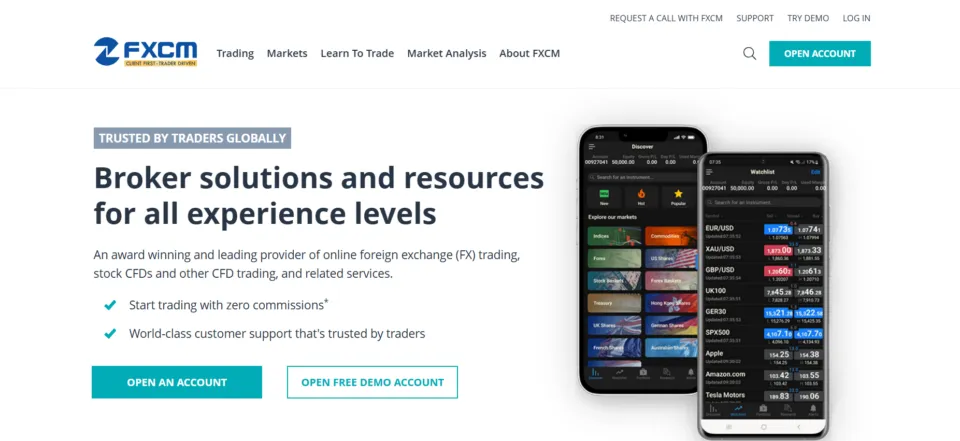
FXCM is another reliable Market Maker Forex broker that gives traders access to forex, crypto CFDs, and a wide range of other CFD instruments. The platform ensures a smooth trading experience thanks to its low-latency order execution, averaging just 23 milliseconds. Additionally, FXCM charges zero commissions on all transactions.
Traders can also take advantage of significant market exposure with relatively small initial capital. All accounts come with a default leverage of up to 1000:1. However, leverage levels are adjusted based on the equity in each account, and FXCM reserves the discretion to modify a trader’s leverage settings as needed.
Key Facts about FXCM
| Feature | Information |
|---|---|
| Market Maker Forex Broker | Yes |
| Minimum Deposit | $50 |
| Execution Type | Market Maker |
| Trading Platforms | MT4, TradingView Pro, Capitalise AI, Trading Station |
| Trading Instruments | Forex, Shares, Indices, ETFs, Crypto |
| Average Execution Speed | 23ms |
| Leverage | Up to 1000:1 |
| Spread | Variable spreads |
| Commissions | Zero |
| Regulations | CySEC, ASIC, FSCA |
| Deposit Options | Bank Transfer, Credit/Debit Card, E-wallets |
| Customer Support | 24/7 |
8. CMC Markets
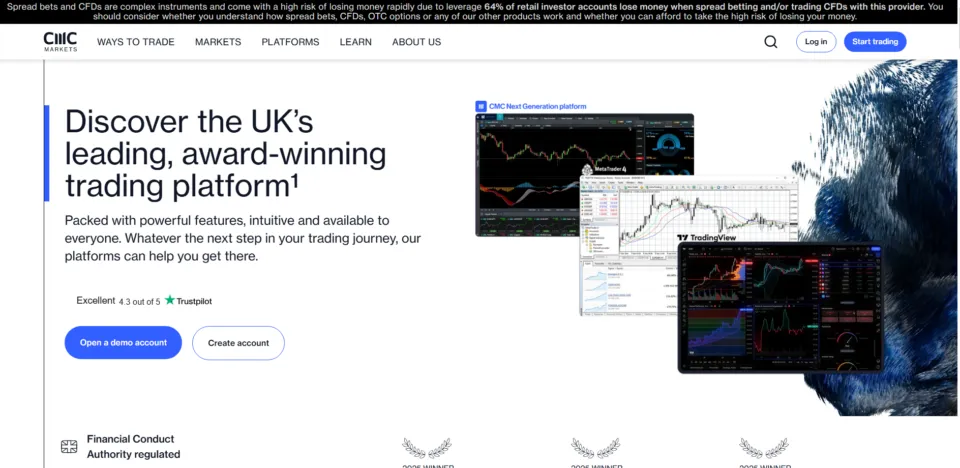
Next on our list of Market Makers Forex Brokers is CMC Markets. With over 35+ years of providing services as a forex broker, CMC Markets provides its clients with expertise, backed by the security and financial strength of a global company.
On CMC Markets, traders can access over 12,000 instruments while providing support 24/5 with their customer care team. Leverages can go as high as 1:200 for products like Indices, Forex, Commodities, Shares, ETFs, Share baskets, Rates & bonds, and Cryptocurrencies with lightning fast execution (< 66milliseconds).
The broker supports trading activities on any of the following platforms MetaTrader 4, MetaTrader 5, Trading View, CMC Mobile App, and CMC Market Platform.
Key Facts about CMC Markets
| Feature | Information |
|---|---|
| Market Maker Forex Broker | Yes |
| Minimum Deposit | $0 |
| Execution Type | Market Maker |
| Trading Platforms | MT4, MT5, Trading View, CMC Mobile App, CMC Market Platform |
| Trading Instruments | Forex, Stocks, Indices, ETFs, Commodities, Energies, Precious Metals, Crypto |
| Average Execution Speed | < 66ms |
| Leverage | Up to 1:200 |
| Spread | From 0.0 pips |
| Commissions | Fixed commission at $2.50 per $100,000 |
| Regulations | BMA |
| Deposit Options | Bank Transfer, Credit/Debit Card, PayPal |
| Customer Support | 24/5 |
9. Libertex
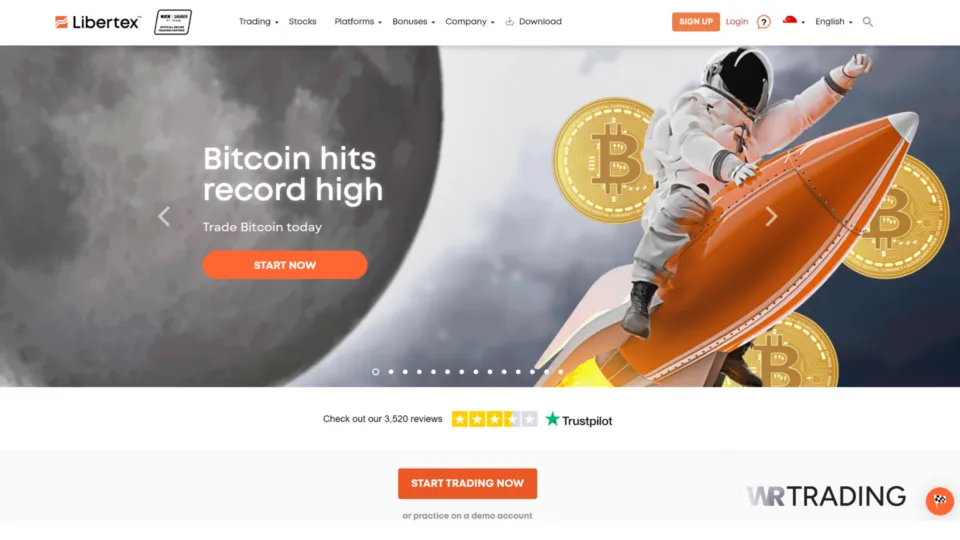
Libertex has been in operation since 1997, giving it more than 27 years of experience in the global financial markets. Over the decades, the broker has built a strong reputation for reliability, user-friendly technology, and diverse trading tools. Today, it serves clients in over 120 countries, making it one of the more internationally accessible platforms available to retail traders.
The broker offers a minimum deposit requirement of just $10, allowing beginners and low-budget traders to get started easily. Libertex supports popular platforms such as MetaTrader 4 and MetaTrader 5, in addition to its own proprietary Libertex App, which is designed with an intuitive interface for seamless trading on the go. Traders also benefit from leverage of up to 1:1000 on various instruments, including forex, commodities, indices, and more.
Key Facts about Libertex
| Feature | Information |
|---|---|
| Market Maker Forex Broker | Yes |
| Minimum Deposit | $10 |
| Execution Type | Market Maker |
| Trading Platforms | MT4, MT5, Libertex App, Libertex Social Trading |
| Trading Instruments | Forex, Stocks, Indices, ETFs, Metal, Agriculture, Precious Oil and Gas, Bonds, Crypto |
| Average Execution Speed | < 100ms |
| Leverage | Up to 1000:1 |
| Spread | From 0.0 pips |
| Commissions | Varies, depending on market |
| Regulations | FSCA, FSC, VFSC |
| Deposit Options | Bank Transfer, Credit/Debit Card, Neteller, Skrill, Crypto |
| Customer Support | 24/7 |
10. Forex.com
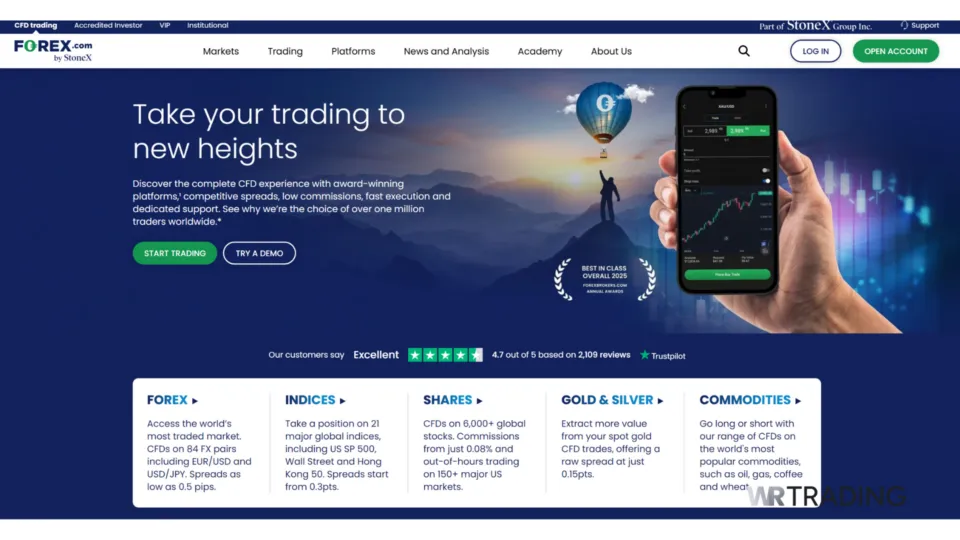
Forex.com rounds off our list of Market Maker Forex Brokers at WR Trading. The broker delivers impressive execution speeds, averaging 2 milliseconds, with 100% of trades filled in under one second on its proprietary platforms. Its advanced automated systems help ensure orders are executed at the expected price with minimal slippage.
It allows users to trade a wide range of products like Forex, Indices, Stocks, Crypto, Commodities, and Crude Oil. The platform supports several convenient deposit and withdrawal options such as Bank Transfer, Skrill, and Neteller. Most deposits are processed instantly, except for bank transfers, which may take up to two business days.
Key Facts about Forex.com
| Feature | Information |
|---|---|
| Market Maker Forex Broker | Yes |
| Minimum Deposit | $100 |
| Execution Type | Market Maker |
| Trading Platforms | WebTrader, MT5, MT4, Forex.com Mobile App |
| Trading Instruments | Forex, Futures, Futures Options |
| Average Execution Speed | < 2ms |
| Leverage | Up to 200:1 |
| Spread | From 0.0 |
| Commissions | $7 USD commission per $100k USD traded |
| Regulations | CIRO, CySEC, CFTC, ASIC, CIMA, FCA, FSA, MAS |
| Deposit Options | Bank Transfer, Credit/Debit Card, Neteller, Skrill |
| Customer Support | 24 hours a day. From 3pm GMT Sunday to 10pm GMT Friday |
Pros and Cons of Market Maker Brokers
When it comes to online trading, Market Maker Brokers play a crucial role in facilitating transactions. While they offer several benefits, they have their drawbacks. Understanding the pros and cons of Market Maker Brokers is essential for traders to make informed decisions about their trading activities.
Pros:
- Commissions are Included in the Spread
- Spreads Can be Fixed or Variable
- Wider Range of Products
- More Features
- No Minimum Deposits
Cons:
- Conflict of Interest
- Lack of Transparency – Hidden Interbank Prices
- Possibility of Trade Rejections or Re-quotes
- Higher Trading Costs
- Scalping Not Encouraged
Pros of Market Maker Brokers
Commissions are Included in the Spread
At WR Trading, we’ve observed that Market Maker brokers typically offer standard accounts with wider spreads, but this doesn’t necessarily translate to higher trading costs. To determine the most cost-effective option, it’s essential to compare the spreads of Market Maker brokers with those of ECN or Pro accounts, considering their respective commissions. This comparison will help you make an informed decision.
For beginners and long-term traders, the simplicity of standard accounts can be a significant advantage, as it eliminates the need to worry about separate commission fees. At WR Trading, we emphasise this benefit, recognising that it can simplify trading and reduce overall costs.
Spreads Can be Fixed or Variable
Market Makers offer fixed or variable spreads. Fixed spreads are rare from non-dealing desk brokers due to constantly changing market prices. However, some Market Makers take on the risk of offering fixed spreads to attract traders seeking predictable trading costs. This can be particularly appealing during times of market volatility.
If knowing your exact trading costs in advance is essential to you, a Market Maker broker with fixed spreads might be the way to go. At WR Trading, we guide our clients in understanding their options, empowering them to make informed decisions that align with their trading styles and preferences.
Wider Range of Products
Market Maker brokers typically offer a broader range of products. While most brokers provide popular CFDs, such as Forex pairs (EUR/USD), indices, gold, silver, and cryptocurrencies, Market Makers take it a step further.
They often include less common options, such as bonds, interest rates, futures, options, and sector indices. You may find a greater variety in Forex pairs, including cross pairs such as GBP/AUD and exotic pairs.
More Features
Market Maker brokers typically provide a richer trading experience with more features than no-dealing desk brokers. Here’s what you can expect:
- Market Makers often develop custom trading platforms to meet their clients’ specific needs, unlike non-dealing desk brokers, who typically use popular platforms such as MetaTrader and cTrader. These custom platforms offer a tailored trading experience, providing unique features. This approach allows Market Makers to cater to their clients’ requirements.
- They offer risk management tools, such as guaranteed stop-loss orders, to help traders manage their risk. Additionally, they provide educational resources, including materials on online trading, Forex trading, and trading strategies. These resources are valuable for both beginners and experienced traders looking to expand their knowledge.
No Minimum Deposits
Most no-dealing desk brokers require a minimum deposit, even if it’s just $1. However, Market Maker brokers rarely require a minimum deposit, making it easier for new traders to start trading without a specific deposit requirement.
Cons of Market Maker Brokers
Conflict of Interest
When working with dealing desk brokers, be aware that there’s an inherent conflict of interest because they make money when you lose. Although most dealing desk brokers operate honestly, this is an essential factor to consider.
Lack of Transparency – Hidden Interbank Prices
Since dealing desk brokers act as intermediaries between you and the liquidity pools, you won’t be able to see the interbank prices set by the liquidity providers.
Possibility of Trade Rejections or Re-quotes
Dealing desk brokers might reject your trades or provide revised quotes, known as re-quotes. For example, if a broker notices a vast and potentially profitable trade, they might examine it more closely. They can process the order internally, pass it on to an external liquidity provider, or reject it altogether.
Higher Trading Costs
Wider spreads mean higher trading costs. If you trade frequently, you may prefer a commission-based trading account to minimise expenses.
Scalping Not Encouraged
Dealing desk brokers aren’t fans of scalping, where traders make many small, quick trades for profit. They lose money when you profit, so they don’t benefit from these practices.
Does a Market Maker Use the B Book Technique?
Yes, a market maker typically employs the B-Book technique. At WR Trading, we observed that market maker brokers execute trades internally within their systems. This means the broker acts as your counterparty. If you place a buy order, the broker sells to you, and if you place a sell order, the broker buys from you.
This setup has led some traders to be sceptical of B-book brokers. They worry that brokers might use their trading history and patterns to their advantage, potentially profiting from them. However, there are several advantages to trading with a B Book forex broker. One key benefit is the guarantee of order fills. Even when market liquidity is low, your trades are more likely to be executed quickly because the broker acts as the market maker. B Book brokers offer fixed spreads, which means that your trading costs remain consistent regardless of market conditions. This can be particularly beneficial during times of market volatility or shocks
On the cost side, fixed spreads mean you pay a set amount every time you open or close a position. While this can simplify trading and provide some predictability in trading costs, it means you’ll need to adjust your trading strategy to account for these fixed costs.
Overall, while the B Book model has some concerns, which we help our clients understand at WR Trading, it offers several practical advantages for traders.
Market Maker vs STP Forex Broker
Market Maker Forex Brokers, also known as Desk-Dealing brokers, create their own market and offer fixed spreads by providing liquidity in the forex markets through buying and selling securities to their traders.
STP brokers, on the other hand, route their orders to liquidity providers (one or a few at a time), such as banks or other brokers on the interbank market, without having to deal with any desk intervention.
| Market Maker | STP Forex Broker |
|---|---|
| Orders are handled inhouse, and they provide liquidity to the market internally. | Orders are sent directly to the liquidity providers or the interbank market at the best available prices |
| Trades are executed instantly with little to no latency | Trade execution speeds can vary depending on market conditions |
| They provide fixed spreads | They offer variable spreads depending on the market volatility. In highly volatile markets, they offer tighter spreads. |
| Liquidity is much smaller since they rely on their internal order book | They have access to a much bigger liquidity pool |
| They profit from your losses since they act as a counterparty to your trades. | Profit is generated from marked up spreads. So they profit whether you win or lose trades. |
Market Maker vs ECN Forex Broker
ECN Forex brokers give traders access to a deep pool of liquidity from multiple banks or brokers on the interbank market without any manual intervention from any person, while Market Maker Forex Brokers handle all their trades internally.
| Market Maker | ECN Forex Broker |
|---|---|
| They profit by being a counterparty to your trades | They profit from commissions on trades |
| The barrier for entry is much lower and volatility is kept in check because they can control the spreads. | Higher minimum deposits is required and are more sensitive to volatility |
| They offer fixed spreads | They offer tighter spreads since there is no mark up included like in STP |
Market Maker vs A Book Broker
At WR Trading, we recognise that when comparing A-book brokers and B-book brokers (market makers), understanding their operating models and implications for traders is crucial.
A-Book brokers send clients’ trade orders directly to liquidity providers or multilateral trading facilities (MTFs), earning money through spreads and commissions. This model, used by ECN and STP brokers, has no conflict of interest since brokers profit from both winning and losing trades. As a result, A-Book brokers benefit from having profitable traders, which increases their turnover and profits. They offer transparency and are less risky for brokers, making them suitable for novices in the Forex industry.
B-book brokers (market makers) process trades in-house, acting as the counterparty to clients’ trades and generating revenue from client losses. This model has a conflict of interest, as brokers profit when clients lose.
These brokers manage risks through internal hedging and other strategies, making this model potentially more profitable but riskier. It is recommended for experienced brokers with sufficient capital to cover potential client profits during favourable market conditions.
A-book brokers provide consistent trading costs through spreads and commissions, while B-book brokers may offer guaranteed fills and fixed spreads but require a continuous influx of new clients due to high client churn rates.
What Are The Most Problems When Using Market Maker Brokers?
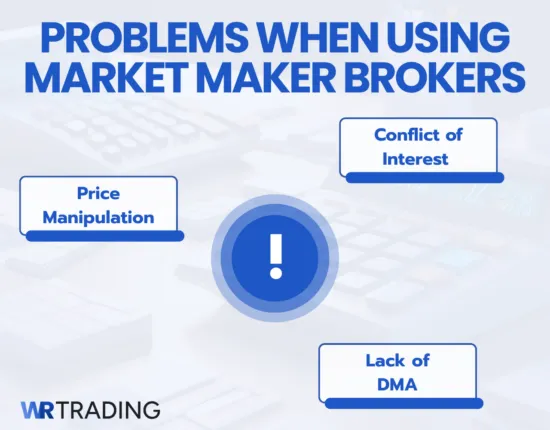
The most problems when using market maker brokers include conflict of interest, the risk of price manipulation and lack of direct market access.
- Conflict of Interest: When traders execute trade, the broker acts as a counterparty to your trade; when you buy they sell. Ultimately, this setup allows the broker to profit when traders lose, creating a potential incentive to act against the trader’s best interests.
- Price Manipulation: Since market makers are in control of the market, they can manipulate prices to their advantage. This may include deliberately moving prices to trigger stop-loss orders or temporarily widening spreads and issuing requotes, especially during major market events. Such actions can lead to unexpected losses or missed profit opportunities for traders.
- Lack of Direct Market Access: Market Marker Brokers set their prices internally instead of sourcing them from the global interbank market. As a result, pricing may differ slightly from actual market prices. Traders may receive different prices than they initially requested (requotes) or experience order freezes during periods of extreme volatility.
Our Recommendation: Trade with Regulated Market Maker Forex Brokers
We recommend trading with regulated Market Maker Forex Brokers because they offer fixed spreads, faster trade execution, round the clock liquidity even during volatile periods in the interbank market.
However, traders should be aware that there is an inherent risk when trading with Market Maker Forex Brokers, especially those that are not regulated or do not have a track record of fair dealings in the past. There’s always the possibility of conflicts of interest. Since these brokers take the opposite side of your trades, they may engage in practices like price manipulation or frequent requotes, which can work against the trader.
Alternatively, traders can stick with ECN/STP brokers to minimize risks associated with Market Maker forex brokers. These brokers send your orders directly to the interbank market, reducing the chances of price interference or unfair execution.
List of the Best 10 Market Maker Forex Brokers :
- AvaTrade: Regulated broker with fixed spreads
- eToro: Fast trade executions on proprietary app
- XTB: Wide range of trading products
- XM: wide range of global assets
- Plus500: efficiency and cost-effectiveness
- IG: Access to a wide range of markets
- FXCM: Zero commission trading platform
- CMC Markets: Award-winning market maker broker
- Libertex: Market maker broker with high leverage
- Forex.com: Ultra-fast execution with fixed spreads.
Frequently Asked Questions on Market Maker Brokers
How Do Market Marker Brokers Differ From ECN/STP Brokers?
Market Maker brokers use a dealing desk to create a market for their clients by taking the opposite side of their trades. They set the bid and ask prices and earn from the spread. In contrast, ECN/STP brokers route orders directly to the interbank market or liquidity providers, bypassing a dealing desk, which results in variable spreads and often lower trading costs. ECN/STP brokers typically charge a commission on each trade.
How Do Market-Maker Brokers Manage Risk?
Market Maker brokers manage risk by using a combination of hedging and netting strategies. They might hedge by taking opposing positions in the market or use a B-Book model where they keep trades in-house, betting that the majority of their clients will lose. Advanced risk management systems and algorithms help them maintain a balanced exposure.
Can Market-Maker Brokers Manipulate Prices?
Yes, there is potential for Market Maker brokers to manipulate prices since they control the bid and ask prices on their platform. This could lead to practices like widening spreads or stop-loss hunting. However, reputable and regulated Market Maker brokers are subject to strict oversight to prevent such activities.
Is It Safe to Trade With a Market Maker Broker?
It is generally safe to trade with a Market Maker broker if they are well-regulated and have a good reputation. Regulatory oversight ensures they follow fair trading practices and maintain financial stability. Always conduct thorough research and choose brokers with strong regulatory compliance.
What is The B-Book Model to Market Maker Brokers?
The B-Book model is a method used by Market Maker brokers to internalise clients’ trades instead of passing them to the open market. In this model, the broker takes the opposite side of the client’s trade, effectively betting against them. The broker profits if the client loses, and vice versa. This model allows brokers to offer fixed spreads and guaranteed liquidity.










